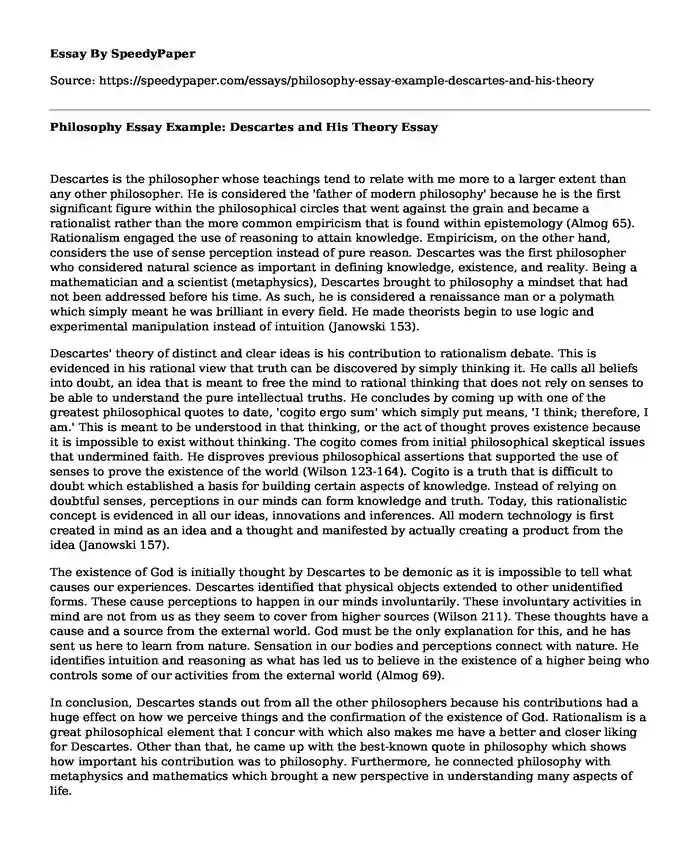
| Type of paper: | Essay |
| Categories: | Philosophers |
| Pages: | 3 |
| Wordcount: | 618 words |
Descartes is the philosopher whose teachings tend to relate with me more to a larger extent than any other philosopher. He is considered the 'father of modern philosophy' because he is the first significant figure within the philosophical circles that went against the grain and became a rationalist rather than the more common empiricism that is found within epistemology (Almog 65). Rationalism engaged the use of reasoning to attain knowledge. Empiricism, on the other hand, considers the use of sense perception instead of pure reason. Descartes was the first philosopher who considered natural science as important in defining knowledge, existence, and reality. Being a mathematician and a scientist (metaphysics), Descartes brought to philosophy a mindset that had not been addressed before his time. As such, he is considered a renaissance man or a polymath which simply meant he was brilliant in every field. He made theorists begin to use logic and experimental manipulation instead of intuition (Janowski 153).
Descartes' theory of distinct and clear ideas is his contribution to rationalism debate. This is evidenced in his rational view that truth can be discovered by simply thinking it. He calls all beliefs into doubt, an idea that is meant to free the mind to rational thinking that does not rely on senses to be able to understand the pure intellectual truths. He concludes by coming up with one of the greatest philosophical quotes to date, 'cogito ergo sum' which simply put means, 'I think; therefore, I am.' This is meant to be understood in that thinking, or the act of thought proves existence because it is impossible to exist without thinking. The cogito comes from initial philosophical skeptical issues that undermined faith. He disproves previous philosophical assertions that supported the use of senses to prove the existence of the world (Wilson 123-164). Cogito is a truth that is difficult to doubt which established a basis for building certain aspects of knowledge. Instead of relying on doubtful senses, perceptions in our minds can form knowledge and truth. Today, this rationalistic concept is evidenced in all our ideas, innovations and inferences. All modern technology is first created in mind as an idea and a thought and manifested by actually creating a product from the idea (Janowski 157).
The existence of God is initially thought by Descartes to be demonic as it is impossible to tell what causes our experiences. Descartes identified that physical objects extended to other unidentified forms. These cause perceptions to happen in our minds involuntarily. These involuntary activities in mind are not from us as they seem to cover from higher sources (Wilson 211). These thoughts have a cause and a source from the external world. God must be the only explanation for this, and he has sent us here to learn from nature. Sensation in our bodies and perceptions connect with nature. He identifies intuition and reasoning as what has led us to believe in the existence of a higher being who controls some of our activities from the external world (Almog 69).
In conclusion, Descartes stands out from all the other philosophers because his contributions had a huge effect on how we perceive things and the confirmation of the existence of God. Rationalism is a great philosophical element that I concur with which also makes me have a better and closer liking for Descartes. Other than that, he came up with the best-known quote in philosophy which shows how important his contribution was to philosophy. Furthermore, he connected philosophy with metaphysics and mathematics which brought a new perspective in understanding many aspects of life.
Works Cited
Almog, Joseph. "Descartes' Cosmological Invariants I: Thinking." Cogito?, 2008, pp. 63-74.
Janowski, Zbigniew. "How Rational is Descartes' Rationalism?" Cartesian Theodicy, 2000, pp. 151-162.
Wilson, Margaret D. Descartes. 2016.
Cite this page
Philosophy Essay Example: Descartes and His Theory. (2022, Jul 28). Retrieved from https://speedypaper.com/essays/philosophy-essay-example-descartes-and-his-theory
Request Removal
If you are the original author of this essay and no longer wish to have it published on the SpeedyPaper website, please click below to request its removal:
- Essay Sample on Sex Exploitation in the UK
- Essay Sample on Customer Empathy and Generational Differences
- Professional Goals Essay Sample
- Marketing Essay Sample: Customer Perception on 4P Marketing Mix
- Economics Essay Sample: The Yield Curve and Recession Prediction
- Free Essay. Jamaica's Voting Culture Over the Last 50 Years
- Essay Sample: Unveiling the Meaning of Love, the Greatest Virtue of All
Popular categories




